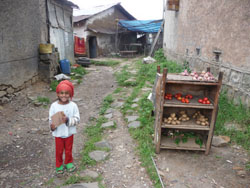18.2.1 Promoting a happy, healthy childhood
A child who comes from a loving home is more likely to grow up into an adult who can trust other people, have good relationships and cope with life’s problems (Figure 18.1).

As you learned in Session 17, children who experience physical, emotional or sexual abuse have a much higher risk of developing a mental illness as an adult. Children can also suffer from the effects of bullying. Bullying is when other children say nasty things or are physically violent towards a child.
In Study Session 17 you read about things you can do when you suspect that a child is being abused (Section 17.4.1). Can you now think of some ways that you could
- a.help to prevent child abuse from happening
- b.reduce bullying in your community?
You can
- a.Educate the community about the importance of a happy, healthy childhood, e.g. by holding an awareness-raising meeting (see Section 18.6).
- b.If you have the chance to speak in a school, you can tell the teachers that (1) bullying is common; (2) bullying can lead to mental illness in the child or later when they grow up; (3) it is important to identify when bullying is taking place and do something about it. You can encourage the school to make a plan for dealing with bullying and supporting the child who is bullied.
18.2 Mental health promotion and primary prevention
